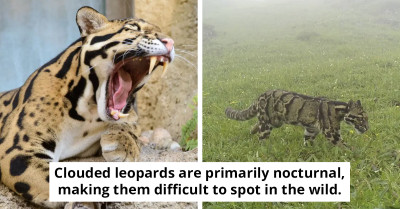
The Superb Fruit-Dove Has A Wonderful Mix Of Colors That Will Make You Fall In Love With It
The name is well deserved.

This bird may not impress you with its size, but its colors will make you fall in love with it. With shades of orange, red, green, and purple, it looks like it just came from a painter's studio.
Nature is, indeed, the best artist. The superb fruit dove (Ptilinopus superbus), AKA the purple-crowned fruit dove (yes, the name is confusingly similar to purple-capped fruit dove), is a medium-sized, colorful fruit-dove in the Columbidae family.
It is sexually dimorphic. Males are superbly colored (hence the name), with a flaming orange nape, green ears, and purple crown.
The chest is grey and divided from the belly by a wide dark blue band. The wings are colored olive green and covered with dark spots.
The tail is tipped with white. Females don't have such vibrant colors or the color mix the males do.
They are predominantly green, with a white belly, blue-tipped wings, and a light blue breast. They also have a small dark blue spot on the back of the head.
Males and females both have yellow eyes and eye-rings. The superb fruit dove is native to Australasia and lives in the rainforests of New Guinea, Indonesia, Australia, Solomon Islands, and the Philippines.
A Superb fruit dove is a medium-sized bird, 8 to 10 inches long
 Instagram/hoojar
Instagram/hoojar
The superb fruit dove prefers areas around the edges of rainforests and in mangroves, and alongside rivers and streams. However, it's not unusual to see them near plantations or urban gardens.
Superb fruit dove is a medium-sized bird, 8 to 10 inches long. It primarily feeds on fruits and berries, and figs are its favorite food. They have a large gape, which allows them to swallow bulky items.
It is sexually dimorphic. Females and males have different color patterns.
 Tobias Spaltenberger – Snowmanradio / CC BY-SA 2.0
Tobias Spaltenberger – Snowmanradio / CC BY-SA 2.0Superb Fruit-Doves are arboreal - living entirely in trees
 Instagram/birdexplained
Instagram/birdexplained
Superb fruit doves breed from September to January, and they build nests on tree branches from 15 to 100 feet high. The female lays just one egg, and both parents incubate it.
Then, they continue to take care of the chick together. The little one will fledge about seven days after hatching.
It primarily feeds on fruits and berries. Figs are its favorite food.
 Instagram/birdexplained
Instagram/birdexplained
Superb Fruit-Doves are arboreal (living entirely in trees) and feed almost exclusively on fruit, mostly in large trees. That makes them difficult to spot, and their presence is most often betrayed by the sound of fruit falling through the leaves and onto the forest floor below.
The superb fruit dove is native to Australasia
 Instagram/hoojar
Instagram/hoojar
The superb fruit dove prefers areas around the edges of rainforests and in mangroves.
 Instagram/emmiee2607
Instagram/emmiee2607They are difficult to spot because they spend most of their lives in high trees.
 Instagram/alec.brennan
Instagram/alec.brennan
The females lay just one egg, and both parents take care of the offspring
 Instagram/caxmlaret
Instagram/caxmlaretWatch them on video:
Superb fruit doves' wings whistle when they fly, and their call is a steady coo-coo-coo-coo. It is not endangered- habitat loss is a primary threat but it is are still fairly widespread and common throughout its extensive range.
It mostly resides in one area but can be nomadic if food becomes scarce.
Damjan







